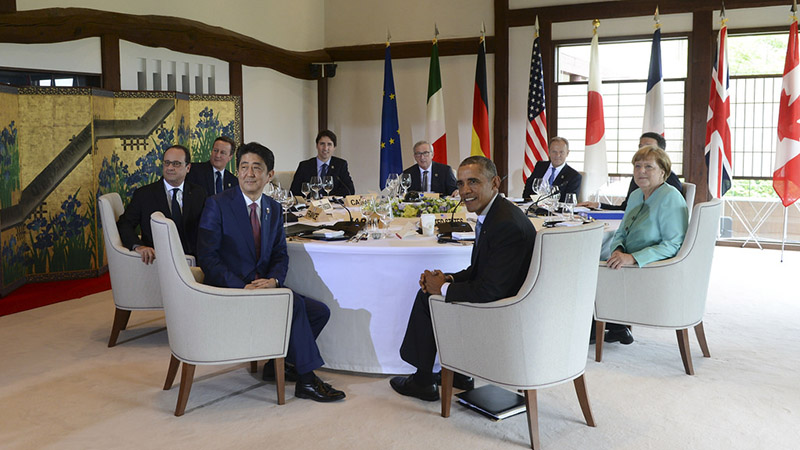Last year’s G7 in Germany marked a turning point in the run up to the historic Paris climate summit.
For the first time a completely fossil-fuel free economy was talked about by world leaders.
The transition from high to zero carbon energy sources moved from the civil society wish-list onto the headlines of a communiqué at a major summit.
It was too much to hope that Japan would show the same level of drive this year, and so it proved. Their homework list on climate is solid but unspectacular, and is unlikely to make headline news.
Yet it is evidence of how far the whole agenda has come, that even Japan – isolated in its determination to sell coal technology to its neighbours and undermining its place in the global clean energy economy – felt obliged to agree significant steps forward in implementing the Paris agreement.
Report: G7 sets 2025 deadline to scrap fossil fuel subsidies
As well as pushing on with ratification and entry into force of the deal itself, G7 leaders also agreed a new 2025 deadline to a pledge to phase out inefficient fossil fuel subsidies.
It’s an idea that has been hanging around in the margins of the G20 for some time, but without the necessary sense of urgency. There was agreement that the 7 would also get to work on their own mid-century climate plans.
The US, Germany and Canada have already promised to have their plans done by the end of this year, so the race is on.
They offer a chance for countries to re-calibrate their efforts and make them compatible with the Paris goals – including limiting temperature rises to 1.5C, and achieving net zero emissions.
But perhaps even more importantly, the plans are a way to have a national conversation about the transition to a zero carbon economy – and to embed new policies and programmes that can help leap-frog dirty technologies, make the most of technical innovation, and identify win-wins.
Here in the UK, we are about to embark on producing our own ‘carbon plan’. Here’s a quick check-list of ideas for the Government about when and how they might do that, to consider as they return home from Japan:
1) Our carbon plan should be used to influence the European 2050 plan, that’s also due for revision soon. We should make sure both are in line with the objectives set by Paris, and also that they are ready in time to contribute to the next key international moment – a big push in 2018 to increase ambition. If Europe turns up to this conversation with nothing, its climate credibility will not survive.
2) The UK’s coal-phase out commitment will be a key part of its plan. This gives us a unique opportunity to work with others who are also moving away from coal – including most of the G7 (Japan being the dishonourable exception) – helping to shape their plans as part of a ‘coal phase out club’.
3) The carbon plan is also great chance to boost the UK’s electric vehicle industry and improve air quality in our cities. Once we know where we are going, we can push Europe to adopt the kinds of vehicle emission standards that will give our clean cars a head-start. This is an area where we can lead the world.
4) Too many of us suffer from cold homes, leaky buildings and high bills. We can use the carbon plan to recruit city leaders and local councils to tackle this perennial problem. Investing in our built infrastructure will make the country healthier and wealthier.
5) Finally, if we want to reach net zero emissions, we will have to start thinking hard about how we look after our land and our ecosystems. Before even considering some of the more speculative ‘negative emission technologies’ we must make full use of the best carbon capturing machines on earth – plants and soils. Restoring and protecting forests and wetlands and rebuilding the fertility of our soils has to be a core part of the plan.
If we want to get started on this stuff (and we should!), we should also make this a truly collaborative effort – involving business, cities, civil society, farmers, faith groups and unions in a national conservation.
The world is going zero-carbon. Now’s the time to decide how we want this exciting journey to work for us.
Ruth Davis is a senior associate at the London-based E3G think tank
